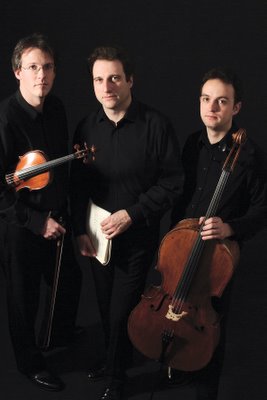Wiener Klaviertrio, Shriver Hall
 The Vienna Piano Trio was the latest group to play in the extraordinary 40th anniversary season at Shriver Hall, and so I found myself compelled to drive up to Baltimore Sunday night to hear them. After all, it's only a few minutes more in the car to get to Johns Hopkins than it was to get to Meredith Monk at George Mason. They brought an attractive program (.PDF file), too, a slice of their namesake city over about a century, beginning with Mozart and ending with Schoenberg, by way of Schubert. In response, Shriver Hall was nearly full with spectators, who heard some extraordinary playing.
The Vienna Piano Trio was the latest group to play in the extraordinary 40th anniversary season at Shriver Hall, and so I found myself compelled to drive up to Baltimore Sunday night to hear them. After all, it's only a few minutes more in the car to get to Johns Hopkins than it was to get to Meredith Monk at George Mason. They brought an attractive program (.PDF file), too, a slice of their namesake city over about a century, beginning with Mozart and ending with Schoenberg, by way of Schubert. In response, Shriver Hall was nearly full with spectators, who heard some extraordinary playing.
First was the earliest, the B-flat trio, K. 502, one of two that Mozart composed in 1786. This work is mostly a showcase for the pianist, who begins each movement by himself and has the lion's share of the challenging music, and Stefan Mendl did a fine job on this part, which at times sounds like a sketch for one of Mozart's piano concerti. In spite of an annoying plinking timbre in the piano (heard only when the una corde pedal is depressed, a condition a technician might be able to correct), Mendl gave a beautiful, understated reading, all melody and Rococo filigree. The other musicians added to the generally restrained, elegant performance in their largely supportive roles. I was pleased to hear the happy first theme, tinged with minor mode shading in the consequent phrases, several times in the monothematic first movement, played with the repeat of the exposition.
Jens F. Laurson, Vienna Piano Trio at the National Gallery of Art (March 10, 2004) |
The piano trio arrangement, which the group played two years ago when Jens reviewed them at the National Gallery, puts emphasis on the main violin and cello parts of the piece, condensing most of the middle texture of Schoenberg's original into the piano part. In a most striking way, however, the Vienna Piano Trio brought more color and subtlety to the work than could have been imagined, setting the steady walking music of the opening in a heavy, hushed character, with muted, almost reedy sounds from cellist Matthias Gredler and violinist Wolfgang Redik. Mendl's piano shimmered in the moonlight of its lovely, soft tremolos, and the players brought such intelligence and Romantic sweep to the sometimes frenetic sounds of the woman's confession (she tells the man she has just fallen in love with that she is already pregnant with another man's child).
Just see how brightly the universe is gleaming!As the section ends on somber minor chords, we expect the worst, but the man insists that the night will transfigure the child, making it his own. Schoenberg takes us into a major tonality, corrupted with Wagnerian extended harmony and harplike textures under a soaring violin melody. The couple starts to walk again, as the opening music returns. Judging from the reactions I heard among members of the audience, the Vienna Piano Trio converted several people to Schoenberg's cause, at least as far as his early works are concerned. Having loved this work in its original sextet form and the composer's own arrangement for chamber orchestra, I was predisposed to like the piano trio arrangement, and I certainly did.
There’s a glow around everything;
You are floating with me on a cold ocean,
But a special warmth flickers
From you into me, from me into you.
Tim Smith, Vienna Piano Trio (Baltimore Sun, February 28, scroll down to the bottom) |
The Vienna Piano Trio will continue its tour of the United States through March 6. The next event at Shriver Hall is a highly anticipated concert by Jordi Savall with Hesperion XXI (March 19, 5:30 pm). Ionarts will certainly be there.





















































5 comments:
We like it when you big city critics spend money here.
I meant to call you to see if you wanted to meet me there, but I know your weekends are usually pretty loaded.
"...but I know on weekends you are usually pretty loaded"??? :) We read betweeb the lines, you know!
I meant in addition to all of the heavy drinking, Jens. ;-)
hic
Post a Comment